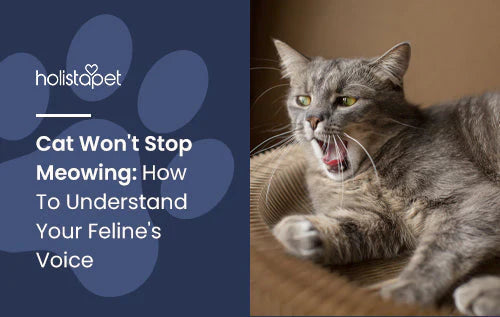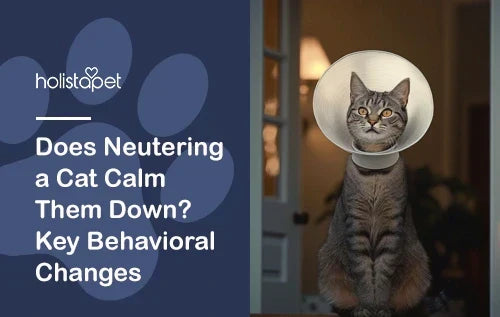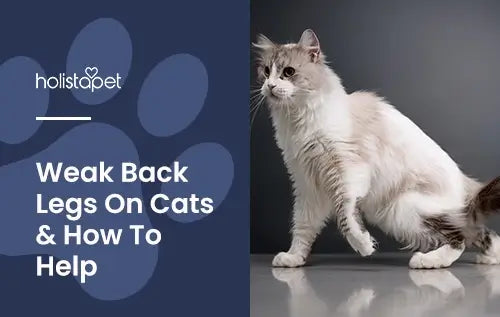Meowing is usually a good thing. Your cat is talking to you! But sometimes, you may not understand why your cat won't stop — like when you're trying to sleep. In that case, all the meowing can get confusing, frustrating, and sleep-depriving. You just have to learn to understand the "meow," and that's exactly what we're here to explain!
Why is My Cat Meowing So Much?
If your cat is becoming increasingly vocal and the meows are loud and aggravating, it can signify a deeper problem. Cat yowling indicates that they might be in pain, stressed, or have an underlying medical disease. If you try all the usual solutions like playing with them and feeding them but their cat crying isn't improving, it's a good idea to take your cat to a vet to see if it could be a more serious issue.
How to Calm a Cat That Won't Stop Meowing
If you're a new cat owner and can't quite pinpoint what meows mean yet, we're here to help! Here are a few common ways to calm a cat that won't stop meowing:
- Play With Your Cat: Your cat may just want to play! Maybe they've been cooped up all day, so when they see you, they want to let all their energy out with some exercise and play. Try to give your cat dedicated exercise and playtime every day. If you're busy and out of the house often, provide plenty of toys, scratchers, or even a cat tree to keep them occupied throughout the day.
- Give Enough Food: A hungry cat is a vocal cat. If they're not getting enough food, they're going to let you know. Try increasing the amount of food during meal times or giving treats throughout the day. You can even try an auto-feeder that dispenses food throughout the day to keep your cat satisfied.
- Give Them Time & Attention: If your cat is stressed, they may just need some time to get used to the changes in their life. The time it takes to adjust can vary from a week to several months, but eventually, they'll be comfortable in their new home or situation. Give them plenty of attention during this time of stress by petting, playing, or simply talking to them.
- CBD Products: If your cat seems to be constantly overwhelmed, stressed, and anxious (also known as a "scaredy-cat"), you may want to try pet CBD products. CBD is a compound found naturally in hemp that does wonders for stressed-out kitties. Here at HolistaPet, we have all-natural, 100% organic CBD calming cat chew treats and CBD oil for cats that can help reduce nervousness and soothe discomfort in your feline friend.
- Get Them Treatment: If your cat is meowing because of an illness or medical condition, take them to the vet to get the treatment they need. If their health improves or they get the medicine they need, the meowing will subside.

Is It Bad if My Cat Meows?
No, not necessarily! Just like all pets, cats have needs, and if you don't meet those needs, they will often remind you with meows. Most of the time, kittens meow when they're lonely, hungry, or playful. They also may be popping in just to say hello, which is especially delightful.
Why Do Cats Meow?
After owning a cat, you or your pet sitter will learn to distinguish their different meows and may even be able to guess what they're trying to tell you. Here are a few of the most common reasons for your cat meowing excessively:
- Saying Hello: Your cat could just be saying hello! Cats will often greet you with a few meows when you come home. They might go into the same room as you and make noise or meow in response to you talking, which is their way of mimicking speech.
- Lonely: If you've been away for a while, your cat may miss you (even if it plays hard to get). Cats are known to be fickle with their social interaction, but sometimes they do miss the company of humans. These meows mean that they want to be pet, played with, or talked to.
- Hungry: Your cat might be hungry. If you notice that they start meowing excessively when someone enters the kitchen (or wherever you keep their food), they likely just want to eat. Some cats may even meow to wake you up in the morning for feeding. They can also meow to beg for human food (like dogs).
- Stressed: Cats will often become more vocal when they're stressed. Stress can happen in many ways, such as moving to a new home or apartment, big changes to a home (like relocating their litter box), missing a certain human, or the loss of other cats or a friend. In some cases, stress may be caused by certain noises or activities.
- Medical Problem: Many medical problems can cause your cat to feel pain, hunger, or thirst, which they will express with excessive meowing. For example, kidney disease or an overactive thyroid can cause discomfort and meowing. If you suspect that a medical issue is the cause of the meowing, it's best to see a veterinarian as soon as possible to get a professional opinion.
- Want to Breed: Your male cat might just be in the mood to breed, which is perfectly natural! If your cat isn't spayed or neutered, they're going to be a lot more chatty at certain times of the month, especially for female cats. If this is the case, your cat will usually yowl (or cry) rather than meow. Females will yowl when they are in heat, and males will yowl when they smell a female in heat.

What Should I Do if My Cat Won't Stop?
Meowing is simply a way to communicate with you (the language of "meow," if you will), and you must do your best to interpret. In this situation, remain calm and try to understand what your cat is going through so you can identify the reason for the constant meowing. Typically, your cat's excessive meowing means they just want food, attention, or to play.
Experienced cat owners can tell between a happy meow, content meow, annoyed meow, and angry meow. Until then, do your best to meet their needs and see if the meowing subsides. If they're meowing while wrapping around your legs, it probably means they're happy to see you. In the case the meow becomes a yowl or cat screaming, they're likely in heat.
When to Be Concerned
Get to your know cat's different meows. Soft meows and purrs are usually nothing to worry about. However, loud meows, excessive meows, or aggravated meows could indicate a deeper problem. If you have tried all the normal solutions and they still don't stop meowing, take your cat to the vet to get a professional opinion. They might have a medical condition, and the earlier you treat it, the better.

Final Thoughts
As cat owners, understanding the "meow" can be difficult. A happy meow sounds almost like a sad meow, and an annoyed meow sometimes sounds like an excited meow (how confusing!). Good communication is the key to a healthy and happy cat, and fortunately, the process with cat meowing becomes easier with time.


 CBD Oil for Cats - Fast Acting
CBD Oil for Cats - Fast Acting
 CBD Cat Treats - Easy Dose
CBD Cat Treats - Easy Dose
 CBD Calming Chews for Cats - Highly Rated
CBD Calming Chews for Cats - Highly Rated
 CBG Oil for Dogs and Cats - Loved by Thousands
CBG Oil for Dogs and Cats - Loved by Thousands





Leave a comment
All comments are moderated before being published.
This site is protected by hCaptcha and the hCaptcha Privacy Policy and Terms of Service apply.